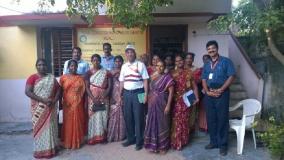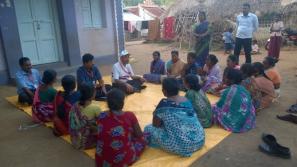MISCELLANEOUS

When we started our self-help group-work about 15 years ago, we never thought, our collective journey would take us so far! At the beginning, it was primarily about saving money together as a group and drawing small loans out of the self-owned pool-fund for household use, and small businesses. This was a huge breakthrough, as for the first time we realized the hidden strength we had within ourselves to bring positive difference in our lives, and families. Today, our role has expanded beyond savings and credits, to areas of larger need of social change in the villages, and beyond. We have stepped-up and reached the level of “demanding political services”, which our elected leaders are supposed to deliver for us. For example, we went as a group to the local PRI office to demand a “Pucca road” (concrete road) which would connect our villages with the high-way going upto Chidambaram commercial town. PRI did not have any budgetary allocation for such a road. We sat with the PRI officials and persuaded them through our collective strength, and helped them reorganize their budget for the year, and thus got a nice road constructed, the one you just travelled through to reach our Federation Office”, proudly described by Latha Ji (name changed), with a big smile of satisfaction on her face. Latha Ji was one of the 13 self-help Federation level leaders, who led the “Jai Hind Federation” in the Kattumannarkoil village of Cuddalore district, Tamil Nadu. I met her along with 13 other leaders of the federation. Sitting at the courtyard of the REAL office, where the “Jai Hind Federation” meets once in a fortnight, I looked into the eyes of each of the 13 women leaders, many of them representing local Dalit (Historically Marginalized) communities, with whom we have been working since the last three years. Together, these 13 women leaders represent 355 self-help groups, with about 5,400 women members, most of them belonging from the Dalit communities.

E InidaLatha Ji told us about the difference “Banking on Change” project of CARE India and its partners, like REAL, bought to this self-help movement. She stated, “Banking on Change brought a completely fresh wave of energy, approach, tools for us to help us to step-up to the next level of engagement with the market and society. We are now a valued customer of a number of Banks. We enter the local branch office of the State Bank of India with confidence, interact with the branch manager and officials there, who we never thought we would have access to, and negotiate various deals. It’s not just the increased amount of loans that we receive now, it is the dignity with which we get treated there. This project helped us reaffirm our rights to access the services which we all are eligible to receive, as citizens of this country!” as Latha Ji ended with a deep breath, her other peers picked up from there… Their stories highlighted the linkages being built, not only with banks, but also with a number of key market and institutional actors, with whom they have been able to establish a mutually beneficial professional and social relationship. As I approached Latha Ji to say good bye, she looked at me, shook my hand very firmly, and asked, “When are you going to come next?” After a short pause, she then said, “It is important for me that you come back, as in your next visit, I will speak in English with you so no one will have to translate my statements for you!” All her peers started laughing loudly, but with a clear belief that she will make it and all of them will make it.
Dr. Musa,
CEO, CARE India from his recent visit to Tamil Nadu




